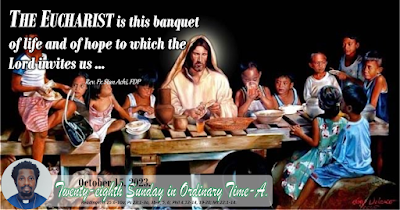BANQUET OF LIFE AND OF HOPE.
October 15, 2023.
Twenty-eighth Sunday in Ordinary Time – A.
“On this mountain the Lord of hosts will provide for all
peoples a feast of rich food and choice wines…” Is 25:6
A Kikuyu proverb says: “Every feast has its guest of honor.”
And a Hebrew proverb adds: “A guest who comes empty-handed does not deserve a
warm welcome.”
Arriving in the Philippines, back in 2014, one beautiful
frame in the dining room of our Seminary of Montalban caught my attention. It
is the famous "Hapag ng Pag-asa", transliterated, as "table of
hope". The singularity of this frame is that it portrays the Last Supper
of the Lord but with very special guests. Not the Twelve Apostles as we traditionally
see it, but with poor boys and girls that the age goes between 4 to 14 years.
Looking closely, the twelve guests of the Lord are squatters. That gives all
the meaning of the frame as the table of hope, a banquet where the less
fortunate find a room and a companion. This tells us also that with the Lord,
there is always new hope. That, despite the despair and poverty that surrounds
us, we should not give up but still carry on our lives and hope for a better
future.
Today's first reading comes to assure us of this future. The
Prophet Isaiah announced what the Lord was about to do for his people.
"LORD of hosts will provide for all peoples a feast of rich food and
choice wines, juicy, rich food and pure, choice wines." Not only will God
provide for the material needs of his people, but he also will bring them
peace, solace, freedom, and consolation. he will destroy the veil that veils
all peoples, destroy death forever, wipe away the tears from every face, and
remove the reproach of his people... This is a great prophecy of hope. For, the
Lord will save his people. As we heard last Sunday, they are his possession. No
matter their sin, no matter our sins, we belong to him. And God cares for what
belongs to him.
In the Gospel, the Lord Jesus takes on the image of the
banquet, a great wedding feast to which the Lord has sent the invitation to
all. There is, however, another trick in today's parable, like all the other
parables about God's kingdom. First, it seems the invitation was given to
exclusive guests. It seems the Lord was referring to the children of Israel and
their leaders. They were the guests of honor. Many of them were invited. But
sadly, as we can read and hear from the Lord, there was a refusal. All of the
invited guests refuse to come, with many arguments and reasons. As says the
dictum, "When you want something, there is a way. When you do not want,
there is a reason."
The Lord, however, did not stop at their first rejection of
his invitation. He will make a second attempt. He tried to explain to them the
content of his menu, some choicest exotic food. But again, regrettably, the
expected guests will ridicule the messengers, treat them ruthlessly, and
mistreat and kill the king's servants. This will have the consequence of
enraging the King.
Looking closely, it is the history of Israel that is
presented, the way God made them his guests of honor, but also how they treated
the prophets he sent them. In his wrath, the Lord gave them over to their
adversaries. They experienced the Babylonian and later on Persian exile.
History tends to repeat itself. The people after the exile got a time of
restoration. God again sent them many other Prophets until John the Baptist,
but the people did not seize the urgency of returning wholeheartedly to the
Lord and accepting his invitation to conversion and life in him. This parable
seems a warning to them about another soon-coming destruction. History tells us
that the Temple and many things in the kingdom will be destroyed by the Romans.
Our life and personal stories and experiences tell us that
every time we refuse the Lord and reject his invitation to conversion, we
expose ourselves to dramatic situations.
The Lord, however, does not give up on us because we
rejected him. He opens again and again his invitation to many. If the first and
privileged guests did not find themselves worthy of the Lord's banquet, now
many more and everyone is invited by the Lord. "Go out, therefore, into
the main roads and invite to the feast whomever you find..." he said. A
hic, however, "Many are invited, but few are chosen.” Though everyone is
invited to God's banquet, there still is a basic requirement, the wedding
garment. We cannot enter into God's embrace and his kingdom without love. Love
is the invitation card. Love is the garment. Love is the passport to God's
banquet. Without love, we are undesirable to God. Thus, the guest who was found
without the proper garment for a banquet. No matter where and how God's
invitation finds us, we should be ready, with love in our hearts. For, with
love, one can do all things and endure everything.
St. Paul, in his own experience, can say: "I can do all
things in him who strengthens me." Because his heart was filled with great
love for the Lord and this love led him to be Apostle of the Lord toward the
Gentiles, he feels that all is possible with love. Even his shortcomings and
his satisfactions, he welcomes them all with love. So, brethren, let us vest
ourselves also with love, and then will we be found worthy of the Lord's
banquet. The faithful people of Philippi seem to have understood the need to
put on the wedding garment, and they expressed it to Paul through their
fraternal charity, concern, and material support for his needs. Love needs
sometimes to be materialized.





Comments
Post a Comment